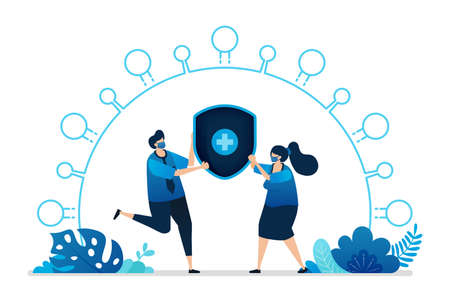Introduction to Blockchain in Healthcare
In recent years, blockchain technology has emerged as a transformative force across various industries, and healthcare in the United States is no exception. As the American healthcare system continues to digitize patient records and adopt new technologies, concerns about data privacy and security are at an all-time high. Blockchain offers a decentralized, tamper-resistant ledger that can help address these concerns by providing secure, transparent, and efficient ways to manage sensitive health information. With its unique ability to ensure data integrity while maintaining patient privacy, blockchain is gaining traction among healthcare providers, insurers, and patients alike. In this article, we will explore how blockchain is being used in healthcare for data privacy and security, and why it is becoming an essential part of the modern American healthcare landscape.
2. Challenges of Data Privacy and Security in U.S. Healthcare
The U.S. healthcare system faces significant challenges when it comes to protecting patient data privacy and ensuring information security. With the growing digitization of medical records, sensitive information is now more vulnerable than ever to cyberattacks and unauthorized access. High-profile data breaches have affected major hospitals, insurance companies, and even government agencies, putting millions of Americans’ health records at risk.
Common Data Privacy Issues
Healthcare organizations must comply with the Health Insurance Portability and Accountability Act (HIPAA), which sets strict standards for safeguarding protected health information (PHI). However, achieving full HIPAA compliance is complex due to fragmented IT systems, lack of standardized protocols, and human error. The table below highlights some of the most frequent privacy and security issues faced by U.S. healthcare providers:
| Issue | Description | Impact on Patients |
|---|---|---|
| Data Breaches | Unauthorized access or theft of electronic health records (EHRs) | Identity theft, financial loss, compromised care |
| HIPAA Non-Compliance | Failure to follow federal privacy regulations | Legal penalties, loss of trust, potential harm to reputation |
| Insider Threats | Employees misusing or leaking sensitive data | Breach of confidentiality, emotional distress |
| Ineffective Access Controls | Lack of proper authentication or authorization measures | Unauthorized parties viewing or altering patient records |
| Poor Data Sharing Practices | Insecure transmission between providers or third parties | Potential exposure to hackers during transfers |
The Trust Gap in Healthcare Data Management
When patients fear their private information may be leaked or misused, they may hesitate to share critical details with their healthcare providers. This “trust gap” can lead to incomplete medical histories and ultimately impact the quality of care received. Restoring confidence requires both robust technological solutions and transparent policies that prioritize patient privacy.
The Need for a Modern Approach
Traditional security methods are struggling to keep up with sophisticated cyber threats. As a result, there is a growing demand for innovative technologies—like blockchain—that offer new ways to protect sensitive health information while meeting regulatory requirements.

3. How Blockchain Enhances Data Privacy
One of the main reasons blockchain technology is gaining traction in healthcare is its unique ability to protect patient information. At its core, blockchain operates as a decentralized ledger, meaning no single entity holds all the data or controls access to it. This decentralization significantly reduces the risk of large-scale data breaches, which have plagued traditional healthcare databases. Each transaction or update on the blockchain is encrypted and recorded as a new block, making it nearly impossible for unauthorized users to alter or access sensitive information without detection.
The cryptographic features of blockchain further strengthen data privacy. Every piece of data stored on a blockchain is protected by advanced encryption algorithms, ensuring that only individuals with the correct cryptographic keys can view or modify records. This gives patients more control over who accesses their medical history, lab results, or personal identifiers. For example, a patient can grant permission to a specific doctor or healthcare provider to view their records without exposing their entire medical history to every party involved in their care.
Moreover, because blockchain creates an immutable record of every action taken within the system, there is full transparency and traceability regarding who accessed what data and when. This audit trail deters potential misuse and helps build trust between patients and providers. In short, the decentralized and cryptographically secure nature of blockchain makes it an ideal solution for safeguarding sensitive health information in an increasingly digital world.
4. Blockchain Use Cases in Healthcare
Medical Records Management
One of the most promising applications of blockchain in U.S. healthcare is the secure management and sharing of electronic health records (EHRs). Traditional EHR systems often face challenges such as data silos, unauthorized access, and inconsistent patient information. With blockchain, each patients record can be cryptographically secured and updated only with proper authorization, ensuring both privacy and data integrity.
Real-World Example: MedRec by MIT
MedRec, a project developed at MIT, leverages blockchain technology to provide patients with a comprehensive, immutable log of their medical history across multiple providers. This system empowers patients to control who accesses their data while providing medical professionals with up-to-date information, streamlining care coordination and reducing errors.
Consent Management
Obtaining and managing patient consent for data sharing is a cornerstone of HIPAA compliance in the U.S. Blockchain solutions enable dynamic and transparent consent management by recording permissions on a tamper-proof ledger. Patients can grant or revoke access in real time, ensuring their preferences are respected at all times.
Real-World Example: Hu-manity.co & IBM Blockchain
Hu-manity.co partnered with IBM Blockchain to launch #My31 App, which allows patients to claim ownership of their health data and manage consent for research or commercial use. This approach not only enhances trust but also streamlines compliance audits for healthcare organizations.
Secure Data Sharing
Blockchain can facilitate secure and efficient data sharing among hospitals, clinics, insurers, and researchers without compromising privacy. This interoperability is especially important in emergency situations or when coordinating care among multiple providers.
Comparison Table: Traditional vs Blockchain-based Data Sharing
| Feature | Traditional Systems | Blockchain Solutions |
|---|---|---|
| Data Control | Provider-centric | Patient-centric |
| Auditability | Limited logs | Immutable records |
| Interoperability | Poor/fragmented | Simplified cross-provider sharing |
| Security Risks | Centrally stored (vulnerable) | Decentralized & encrypted |
| User Consent Management | Cumbersome/manual | Automated/smart contracts |
Real-World Example: Synaptic Health Alliance
The Synaptic Health Alliance—a coalition including major U.S. insurers like Humana and UnitedHealthcare—uses blockchain to update provider directories efficiently. By securely sharing verified data on a shared ledger, members reduce duplication, improve accuracy, and comply with regulatory requirements for timely updates.
Together, these examples highlight how blockchain is not just a theoretical solution but an active force shaping the future of data privacy and security in American healthcare.
5. Potential Barriers and Considerations
While blockchain technology holds significant promise for enhancing data privacy and security in American healthcare, several key barriers and considerations must be addressed before widespread adoption can occur.
Regulatory Challenges
The U.S. healthcare industry is heavily regulated, with laws like HIPAA (Health Insurance Portability and Accountability Act) setting strict standards for patient data privacy and security. Integrating blockchain solutions requires careful alignment with these regulations. Since blockchain creates immutable records, there are concerns about whether patients can exercise their rights to amend or delete health information as required by law. Additionally, the lack of clear regulatory guidelines specific to blockchain often leads to uncertainty among healthcare providers and tech developers.
Technical Hurdles
Implementing blockchain in healthcare systems presents unique technical challenges. For one, blockchain networks can struggle to handle the high volume and size of healthcare data, such as medical images or genomic files. There are also interoperability issues; many American hospitals use legacy electronic health record (EHR) systems that may not easily connect with new blockchain platforms. Scalability, speed, and energy consumption are further concerns that must be addressed to ensure practical and sustainable deployment.
Adoption Obstacles
Widespread adoption of blockchain in U.S. healthcare depends on buy-in from a broad range of stakeholders, including patients, providers, insurers, and regulators. Many organizations remain skeptical due to the perceived complexity of blockchain technology and the cost of overhauling existing infrastructure. Training staff, integrating new workflows, and ensuring user-friendly interfaces are additional hurdles that can slow down or complicate implementation efforts.
Considerations for Moving Forward
To overcome these barriers, stakeholders should focus on developing clear regulatory frameworks tailored to blockchain’s unique properties. Pilot programs and partnerships between health systems, tech companies, and government agencies can help demonstrate value while identifying best practices for integration. Education campaigns aimed at demystifying blockchain for both healthcare professionals and patients will also be critical in building trust and fostering adoption across the American market.
6. The Future of Blockchain in Healthcare Security
As the U.S. healthcare industry continues to grapple with rising cybersecurity threats and growing concerns over patient data privacy, blockchain technology is poised to play an increasingly vital role in shaping the future of healthcare security.
Predictions for Blockchain Adoption
Experts predict that blockchain will move beyond pilot programs and see broader adoption across hospitals, insurance companies, and health tech startups. As regulatory frameworks evolve to support blockchain-based solutions, more healthcare providers are expected to leverage decentralized ledgers to ensure secure and transparent handling of electronic health records (EHRs), insurance claims, and clinical research data.
Enhanced Patient Control and Trust
One of the most promising opportunities lies in giving patients greater control over their personal information. With blockchain, individuals can grant or revoke access to their medical records on a case-by-case basis, fostering trust between patients and providers while minimizing unauthorized access. This patient-centered approach is particularly appealing in the U.S., where privacy rights are highly valued.
Opportunities for Innovation
The integration of blockchain with emerging technologies such as artificial intelligence and Internet of Things (IoT) devices opens up new avenues for secure data sharing and real-time analytics without sacrificing privacy. Smart contracts could automate consent management, billing processes, and even clinical trial participation, streamlining workflows while maintaining robust security standards.
Challenges Ahead
Despite these opportunities, widespread adoption will require overcoming hurdles such as interoperability with legacy systems, regulatory uncertainty, and the need for industry-wide standards. However, as more U.S. healthcare organizations recognize the value of blockchain for data integrity and patient safety, investment in education and infrastructure is likely to accelerate.
A More Secure Healthcare Ecosystem
Looking ahead, blockchain has the potential to redefine how sensitive health information is protected and shared in America. By building a foundation of trust through transparency and immutability, blockchain can help create a more secure healthcare ecosystem—one where privacy isn’t just an afterthought but a fundamental right supported by cutting-edge technology.
